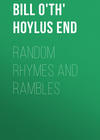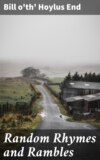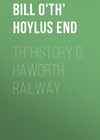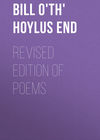Loe raamatut: «Random Rhymes and Rambles»
Dedicated to
James Wright,
Local Musician and Composer,
North Beck Mills,
Keighley,
By the Author.
Dec. 25th, 1876.
INTRODUCTION
The RANDOM RHYMES and RAMBLES, in verse and prose, are but the leisure musings of the uneducated, and cannot be expected to come up to anything like the standard of even poetry; yet, when the fact is known that the Author, like his Works, are rough and ready, without the slightest notion of either Parnassus or the Nines, at least give him credit for what they are worth.
WILLIAM WRIGHT.
Come Nivver De e Thee Shell
Come nivver dee e thy shell, oud lad,
Are words but rudely said;
Tho thay may chear some stricken heart,
Or raise some wretched head;
For thay are words I love mysel,
They’re music to my ear;
Thay muster up fresh energy
Ta chase each dout an’ fear.
Nivver dee e thy shell, oud lad,
Tho tha be poor indeed;
Ner lippen ta long it turning up
Sa mich ov a friend in need;
Fer few ther are, an’ far between,
That helps a poor man thru;
An God helps them at helps thersel,
An’ thay hev friends enew.
Nivver dee e thy shell, oud lad,
What ivver thy crediters say;
Tell um at least tha’rt forst ta owe,
If tha artant able ta pay;
An if thay nail thy bits o’ traps,
An sell thee dish an’ spooin;
Remember fickle fortun lad,
Sho changes like the mooin.
Nivver dee e thy shell, oud lad,
Tho some ma laugh an scorn;
There wor nivver a neet ’fore ta neet,
Bud what there come a morn;
An if blind fortun used thee bad,
Sho’s happen noan so meean;
Ta morn al come, an then for some
The sun will shine ageean.
Nivver dee e thy shell, oud lad,
Bud let thy motto be, —
“Onward! an’ excelsior;”
And try for t’ top o’t tree:
And if thy enemies still pursue,
Which ten-to-one they will,
Show um oud lad tha’rt doing weel,
An climbing up the hill.
Oud Betty’s Advice
So Mary, lass, tha’rt bahn to wed
It morning we young blacksmith Ned,
And tho it makes thy mother sad,
Its like to be;
I’ve nout ageean yond decent lad
No more ner thee.
Bud let me tell thee what ta due,
For my advice might help thee thru;
Be kind, and to thy husband true,
An I’ll be bun
Tha’ll nivver hev a day ta rue,
For out tha’s done.
Nah, try to keep thi former knack,
An due thi weshing in a crack,
Bud don’t be flaid to bend thi back,
Tha’ll nobbut sweeat;
So try an hev a bit o’ tack,
An do it neat.
Be sure tha keeps fra being a flirt,
An pride thysel e being alert, —
An mind to mend thi husband’s shirt,
An keep it clean;
It wod thy poor oud mother hurt,
If tha wor mean.
Don’t kal abaht like monny a wun,
Then hev to broil, an sweeat, an run;
Bud, alus hev thy dinner done,
Withaht a mooild;
If its nobbut meil, lass, set it on,
An hev it boiled.
So Mary, I’ve no more to say —
Tha gets thy choice an’ tak thy way;
An if tha leets to rue, I pray,
Don’t blame thy mother:
I wish you monny a happy day
We wun another.
The Fugitive: a Tale Kersmas Time
We wor snugly set araand the hob,
’Twor one wet Kersmas Eve,
Me an arr Kate an t’ family,
All happy aw believe:
Aar Kate hed Harry on her knee,
An’ awd aar little Ann,
When their come rapping at the door
A poor oud beggar man.
Sleet trinkled down his hoary locks,
That once no daht were fair;
His hollow cheeks were dead’ly pale,
His neck and breast were bare;
His clooase, unworthy o’ ther name,
Were raggd an steepin wet;
His poor oud legs were stockingless,
And badly shooed his feet.
Come in to’t haase, said t’ wife to him,
An get thee up to’t fire;
Sho then brought aht were humble fare,
T’wor what he did desire;
And when he’d getten what he thowt,
An his oud regs were dry,
We akst what distance he hed come,
An thus he did reply:
“Awm a native of Cheviot hills,
Some weary miles fra here;
Where I like you this neet hev seen
Mony a Kersmas cheer;
Bud I left my father’s haase, when young,
Determined aw wad roaam;
An’ like the prodigal of yore,
Am mackin toards mi hoame.
“Aw soldiered in the Punjaub lines,
On India’s burning sand;
An nearly thirty years ago
Aw left me native land;
Discipline being ta hard for me,
My mind wor always bent;
So in an evil hoar aw did
Desart me regiment.
An nivver sin durst aw go see
My native hill an glen,
Whar aw mud now as well hev been
The happiest ov all men;
Bud me blessing – an aw wish yah all
A merry Kersmas day;
Fer me, awl tack me poor oud bones,
On Cheviot hills to lay.”
“Aw cannot say,” aw said to’t wife,
“Bud aw feel rather hurt;
What thinks ta lass if tha lukes aht,
An finds t’oud chap a shirt.”
Sho did an all, and stockins too;
An tears stud in her e’e;
An in her face the stranger saw
Real Yorkshire sympathee.
Ahr little Jim gav monny a sigh,
When he hed heard his tale,
An spak o’ some oud trouses,
At hung at chamer rail;
Then aht at door ahr Harry runs,
An back agean he shogs,
He’s been it coit ta fetch a pair
O’ my oud iron clogs.
It must be feearful coud ta neet,
Fer fouk ats aht at door;
Give him yahr oud grey coit an’ all,
At’s thrown at chamer floor:
And then thars thy oud hat, said Kate,
At’s paused so up an dahn;
It will be better ner his own,
Tho’ its withaht a craan.”
So when we’d geen him what we cud,
(In fact afford to give,)
We saw the tears come dahn the cheeks,
O’t poor oud fugitive;
He thank’d us ower an ower agean
And often he did pray,
At barns mud nivver be like him;
Then travelled on his way.
Sall at Bog
Me love is like the pashan dock,
That grows it summer fog;
And tho’ sho’s but a country lass,
I like my Sall at Bog.
I walk’d her aht up Rivock End,
And dahn a bonny dale,
Whear golden balls an kahslips grow,
An butter cups do smell.
We sat us dahn at top o’t grass,
Cloyce to a runnin brook,
An harkend watter wegtails sing
Wi’t sparrow, thrush, an’ rook.
Aw lockt her in my arms, an thout
Az t’sun shane in her een,
Sho wor the nicest kolleflaar
At ivver aw hed seen.
’Twor here we tell’d wer tales o’ love,
Beneath t’oud hazel tree;
How fondly aw liked Sall at Bog,
How dearly sho liked me.
An’ if ivver aw deceive thee, Sall,
Aw vow be all aw see,
Aw wish that aw mud be a kah,
An it belong ta thee.
Bud aw hev plump fergotten nah
What awther on us said;
At onny rate we parted friends,
An boath went home ta bed.
Th’ Furst Pair o’ Briches
Aw remember the days o’ me bell-button jacket,
Wi its little lappels hanging down ower mi waist,
And my grand bellosed cap, – noan nicer I’ll back it, —
Fer her at hed bowt it wor noan without taste;
Fer sho wor mi mother an’ I wor her darling,
An offen sho vowed it, and stroked dahn mi hair,
An sho tuke me to see her relations e Harden,
It furst Pair o’ Briches it ivver aw ware.
Aw remember the time when Aunt Betty an’ Alice
Send fer me up to lewk at mi cloas,
An aw wauked up as prahd as a Frenchman fra Calais,
Wi’ me tassel at side, e mi jacket a rose.
Aw sooin saw mi uncles, both Johnny an’ Willy,
Thay both gav me pennys an off aw did steer:
But aw heeard um say this, “He’s a fine lad is Billy,
It furst Pair o’ Briches at ivver he ware.”
Aw remember the time are Robin an’ Johnny
Wor keeping ther hens an’ ducks e the yard,
There wor gamecocks and bantams, wi’ toppins so bonny
An noan on um mine, aw thowt it wor hard.
But aw saved up mi pennies aw gat fer mail pickin’
An sooin gat a shilling by saving it fair,
Aw then became maister at least o’ wun chicken,
It furst Pair o’ Briches at ivver aw ware.
Aw remember wun Sabbath, an t’ sun it wor shining,
Aw went wi mi father ta Hainworth, to sing
An t’ stage wor hung raand wi green cotton lining;
And childer e white made t’ village ta ring.
We went ta auld Mecheck’s that day to wor drinking,
Tho’ poor, ther wor plenty, an’ summat ta spare;
Says Mecheck, “That lad, Jim, is just thee, aw’m thinking,
It furst Pair o’ Briches at ivver tha ware.”
Now them wor the days o’ grim boggards and witches,
When Will-o’-the-wisp cud be seen in the swamp,
But nah is the days o’ cheating fer riches,
And a poor honist man is classed wi a scamp.
Yes, them wor the days at mi mind worrant weary;
O them wor the days aw knew no despair;
O give me the time o’ the boggard and fairy,
Wi’t furst Pair o’ Briches at ivver aw ware.
And them wor the days aw sal allus remember,
Sud aw just as oud as Methuslah last;
Them wor mi March days, but nah its September:
Ne’er to return again – them days are past.
But a time aw remember aboon onny other,
Aw kneeled o’ mi knees an sed the Lord’s Prayer;
Aw sed God bless me father, an God bless mi mother,
It furst Pair o’ Briches at ivver aw ware.
Fra Haworth ta Bradford
Fra Hawarth tahn the other day,
Bi’t rout o’ Thornton height,
Joe Hobble an’ his better hauf,
Went inta Bradford streight.
Nah Joe i’ Bradford wor afoor,
But sho hed nivver been;
Bud assomivver thay arrived
Safe intat Bowling Green.
Thay gav a lad a parkin pig,
As on the street thay went;
Ta point um aht St. George’s Hall,
An Oastler’s Monument.
Bud t’ little jackanapes being deep,
An thought thay’d nivver knaw,
Show’d Joseph Hobble an’ iz wife
T’ furst monument he saw.
Az sooin as Joe gat up t’ rails,
Hiz e’en blazed in hiz heead;
Exclaiming, thay mud just as weel
A goan an robb’d the deead.
Bud ’o ivvers tane them childer dahn,
Away fra poor oud Dick,
Desarvs hiz heaad weel larapin,
We a dahn gooid hazel stick.
T’ lad seeing Joe froth ate at maath,
He sooin tuke to hiz heels,
Fer at steead o’ Oastlers’ Monument,
He’d shown um Bobby Peel’s.
O, Welcome, Lovely Summer
O! welcome, lovely summer,
With thi golden days so long,
When the throstle and the blackbird
Charm us with their song;
When the lark in early morning
Taks his aireal flight;
An’ the humming bat, an’ buzzard,
Frolic in the night.
O! welcome, lovely summer,
With her rainbow’s lovely form;
Her thunder an’ her leetnin,
An’ her grandeur in the storm:
With her sunshine and her shower,
And her wurlin of the dust;
An the maiden with her flagon,
To slack the mower’s thirst.
O! welcome, lovely summer,
When the woods wi music ring,
And the bees so hevvy laden,
To their hives their treasures bring:
When we seek some shady bower,
Or some lovely little dell,
Or bivock in the sunshine,
Besides some cooling well.
O! welcome, lovely summer,
With her roses in full bloom;
When the cowslaps an’ the lalack
Deck the cottage home;
When the cherry an’ the berry,
Gives a grandeur to the charm;
And the clover and the haycock
Scent the little farm.
O! welcome, lovely summer,
With the partridge on the wing;
When tewit an the moorgame,
Up fra the heather spring,
From the crowber an the billber,
An the bracken an the ween;
As from the noisey tadpole,
We hear the crackin din.
O! welcome, lovely summer.
Burns’s 113th Birthday
Go bring that tuther whisky in,
An put no watter to it;
Fer I mun drink a bumper off,
To Scotland’s darling poet.
Its a hunderd year an thirteen nah,
This Jenewary morn,
Sin in a lowly cot i’ Kyle,
A rustic bard wor born.
He kettled up his moorland harp,
To ivv’ry rustic scene;
An sung the ways o’ honest men,
His Davey and his Jean.
Their wor nivver a bonny flaar that grew,
Bud what he could admire;
Their wor nivver lovely hill or dale,
That suited not his lyre.
At last ould Coilia sade enuff,
My bardy tha did sing,
Then gently tuke his moorland harp,
And brack it ivvery string.
An’ bindin’ up the holly wreath,
We all its berries red,
Sho placed it on his noble brow,
An pensively sho said: —
“So long as Willies bru ther malt,
An Robs an Allans spree;
Mi Burns’s songs an Burns’s name,
Remember’d thay shall be.
Waiting for t’ Angels
Ligging here deead, me poor Ann Lavina,
Ligging alone me own darling child,
Just thee white hands crossed on thee bosom,
We features so tranquil, so calm, and so mild.
Ligging here deead, so white an’ so bonny,
Hidding them eyes that oft gazed on mine;
Asking for sommat withaht ever speaking,
Asking thee father to say tha wor fine.
Ligging here deead, the child that so loved me,
At fane wod ha’ hidden me faults if sho could,
Wal thi wretch of a father dispairing stands ower thee,
While remorse and frenzy is freezing his blood.
Ligging here deead, e thee shroud an thee coffin,
Ligging alone in this poor wretched room,
Just thee white hands crossed ower thee bosom,
Waiting for t’angels to carry thee home.
Spring
There is hope in the time that is coming,
When the lambs will frolic on the plain,
Whilst the bees o’er the heather are humming,
Then the songsters will cheer us again.
For the pretty little birds from the edges,
The reeds for their nest will have riven;
While the lark from his covert he is soaring,
His musical notes to the heaven.
Then we’ll go to the banks of the river,
Through meadows that’s blooming in green,
Where the swallow ’neath the branches will quiv’r
O’er the fish as they sport in the stream:
Then the farmer will be patiently awaiting,
For the fruits of that labour he has striven,
While the lark from his covert he is soaring,
His musical notes to the heaven.
Then the rays of the sunbeam we’ll cherish,
The rose that’s unseen in the bud,
And the foxglove and hyacinth will flourish,
Round the ferns in the depths of the wood:
Then we’ll pluck up the primrose and daisy,
And the sweets that nature she has given,
While the lark from his covert he is soaring,
His musical notes to the heaven.
Then the merry little boys they will ramble,
So gleesome, o’er mountain and dale,
Where the sweets of the rose through the bramble
Will be blown by the mild summer gale:
Then a share of Nature’s smiles each morning
To the poor humble peasant will be given.
While the lark from his covert he is soaring,
His musical notes to the heaven.
Haworth Sharpness
Says a wag to a porter e Haworth one day,
“Yahr not ower sharp are ye drones o’ t’railway,
For fra Keighley to Haworth I’ve been oft enough,
But nivver a hawpenny I’ve paid yah, begoff.”
The porter replied, “I very mitch daht it,
But I’ll give thee a quart to tell all abaht it;
For it looks plain to me tha cuddant pass t’ snicket,
Baht tipping to t’porter thee pass or thee ticket.”
“Tha’l rite up to Derby an’ then tha’l deceive me;”
“I willn’t, this time,” sed t’porter, “believe me:”
“Then aht we thy brass, an’ let us be knocking,
For I’ve walked it a foot back all rahnd be t’Bocking.”
The Lass o’ Newsholme Dean
[Having spent the whole of the afternoon in this romantic little glen, indulging in pleasant meditations, I began to wend my way down the craggy pass that leads to the bonny little hamlet of Goose Eye, and turning round to take a last glance at this enchanting vale – with its running wimpling stream – I beheld the “Lass o’ Newsholme Dean.” She was engaged in driving home a Cochin China hen and her chickens. Instantaneously I was seized with a poetic fit, and gazing upon her as did Robert Tannyhill upon his imaginary beauty, “The Flower of Dumblane.” I struck my lyre, and, although the theme of my song turned out afterwards to be a respectable old woman of 70 winters, yet there is still a charm in my “Lass o’ Newsholme Dean.”]
Thy kiss is sweet, thy words are kind,
Thy love is all to me;
Aw cuddant in a palace find
A lass more true ner thee.
An’ if aw wor the Persian Shah,
An’ thee, me Lovely Queen,
The grandest diamond e me Crown,
Wor’t lass o’ Newsholme Dean.
The lady gay may heed thee not,
An’ passing by may sneer;
The upstart squire’s dawters laugh,
When thou, my love, art near.
But if all ther shining sovrens
Wor wared o’ sattens green,
They mightant be as hansum then
As’t lass o’ Newsholme Dean.
When yollow autumn’s lustre shines,
An’ hangs her golden ear,
An’ nature’s voice fra every bush,
Is singing sweet and clear.
’Neath some white thorn to song unknown,
To mortal never seen,
’Tis there with thee I fain would be,
Me lass o’ Newsholme Dean.
Od drat, who cares fer kings or queens,
Mixt in a nation’s broil,
They never benefit the poor,
The poor mun allus toil.
An thou gilded specter royalty,
That dazzles folkses een,
Is nowt to me when I’m we thee,
Sweet lass o’ Newsholme Dean.
High from the summit of yon crag,
I view yon smoky town,
Where fortune she has deigned to smile
On monny a simple clown:
Tho’ free from want, their free from brains;
An’ no happier I ween,
Than this old farmer’s wife an’ hens,
Aw saw e Newsholme Dean.
The Broken Pitcher
[The happiest moments of a soldier in time of peace is when sat round the hearth of his neat little barrack room, along with his comrades, spinning yarns and telling tales; sometimes giving the history of some famous battle or engagement in which he took a prominent part, othertimes he will relate his own love adventures; then the favourite of the room will oblige them with his song of “Nelson” or “Napoleon,” generally being the favourite with them; – then there is the fancy tale teller which amuses all. But in all cases the teller of a tale, yarn or story makes himself the hero of it, and especially when he speaks of the lass he left behind him; hence his adventure with the Lassie by the Well.”]
Three was a bonny Lassie once
Sitting by a well;
But what this bonny lassie thought
I cannot, cannot tell.
When by there went a cavalier
Well-known as Willie Wryght,
He was in full marching order
With his armour shining bright.
“Ah maiden, lovely maiden, why
Sits thou by the spring?
Doest thou seek a lover with
A golden wedding ring.
Or wherefore doest thou gaze on me,
With eyes so bright and wide?
Or wherefore does that pitcher lay
Broken by thy side?”
“My pitcher is broken, sir,
And this the reason is,
A villain came behind, and
He tried to steal a kiss.
I could na take his nonsense, so
Ne’er a word I spoke,
But hit him with my pitcher,
And thus you see ’tis broke.”
“My uncle Jock McNeil, ye ken
Now waits for me to come;
He canna mak his Crowdy,
Till’t watter it goes home.
I canna tak him watter,
And that I ken full weel,
An’ so I’m sure to catch it, —
For he’ll play the varry de’il.”
“Ah maiden, lovely maiden,
I pray be ruled by me;
Smile with thine eyes and ruby lips,
And give me kisses three.
And we’ll suppose my helmet is
A pitcher made o’ steel,
And we’ll carry home some watter
To thy uncle Jock McNeil.”
She silently consented, for
She blink’d her bonny ee,
I threw my arms around her neck,
And gave her kisses three.
To wrong the bonny lassie
I sware ’t would be a sin;
So I knelt down by the watter
To dip my helmet in.
Out spake this bonny lassie,
“My soldier lad, forbear,
I wodna spoil thee bonny plume
That decks thy raven hair;
Come buckle up thy sword again,
Put on thy cap o’ steel,
I carena for my pitcher, nor
My uncle Jock McNeil.”
I often think, my comrades,
About this Northern queen,
And fancy that I see her smile,
Though oceans roll between.
But should you meet her Uncle Jock,
I hope you’ll never tell
How I squared the broken Pitcher,
With the lassie at the well.















